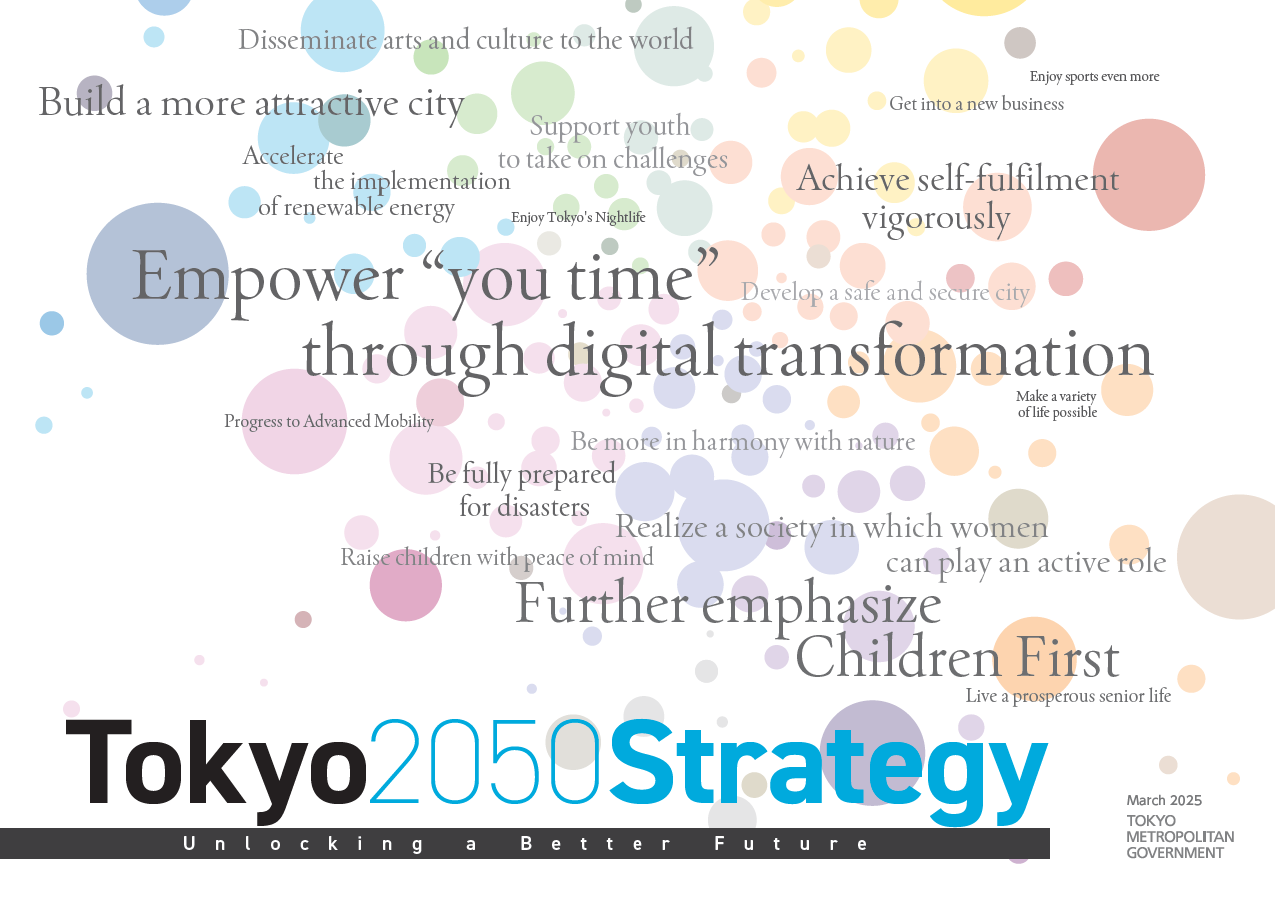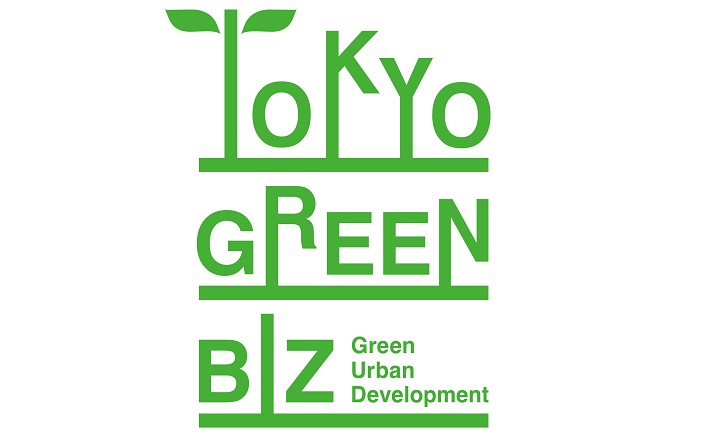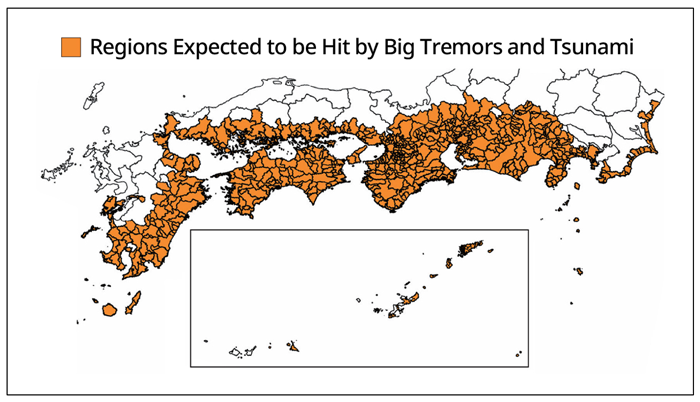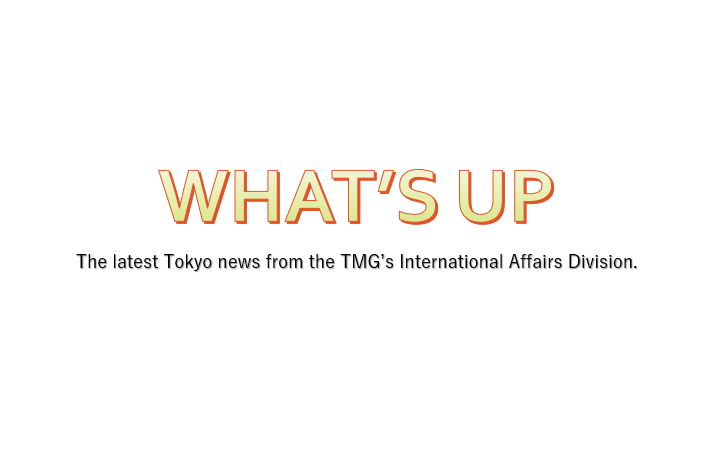Policy Speech by the Governor of Tokyo, Yuriko Koike, at the Fourth Regular Session of the Tokyo Metropolitan Assembly, 2017
In opening the fourth regular session of the Tokyo Metropolitan Assembly in 2017, I wish to relate my basic stance on future metropolitan administration.
Honorable Citizen and wood carving master craftsman Tadao Kishimoto passed away on October 6. Yasutaka Komiya, an artisan of fabric dyeing, who was also an Honorable Citizen, passed away on October 24. I would like to express my sincerest condolences to their families. May they rest in peace.
First of all, I would like to apologize for the trouble and concern my actions during the recent general election caused many of you. Firmly taking this to heart, I would like to redevote myself to metropolitan affairs from the stance that the citizens of Tokyo come first. Your guidance and cooperation to this end will be highly appreciated.
1. Introduction
-
Can Tokyo keep up in this world of tumultuous change? With the rapid progression of population decline and aging expected to trigger an unprecedented crisis, Tokyo must accelerate the pace of reform.
According to the 2015 Population Census, the total population of Japan was 127.09 million, a decline of about 960,000 people from the previous survey. This was the first decline recorded since the start of the census. Even Tokyo’s population is expected to peak at 13.98 million in 2025 when the last of the baby boomers will reach 75, and then decline. And, according to projections by the central government, if Japan’s population continues to decline at the current pace and advancements are not made in productivity reform, negative economic growth will firmly take hold in the 2040s.
Under such circumstances, we will not be able to open up a bright future for Tokyo and Japan if we continue to administer affairs in a manner that is an extension of what has come before. Japan’s labor productivity is the lowest of the G7 countries. The participation of women in society is also not advancing as hoped. Japan’s ranking in a World Economic Forum report, which looks at gender equality and other conditions in countries around the world, has slipped further below its place last year. For our country to break through the current situation and plot a course to growth even as the population declines, Tokyo -- the engine of the Japanese economy -- must accelerate reform and propel all of Japan.
-
Meanwhile, the central government is needlessly inciting a sense of confrontation between Tokyo and rural areas, taking actions that could lead to dampening Tokyo’s growth potential, and by extension, Japan’s international competitiveness. Capping the enrollment capacity and creation of new faculties at universities in Tokyo’s 23 special wards will only serve to lower the international standing of Japanese universities, which is already dropping drastically.
Furthermore, the review of criteria for redistributing local consumption tax contorts the original purpose of the tax, which is to assign tax revenue to the location where final consumption takes place, and it is nothing more than an attempt to force Tokyo and the other areas that support Japan’s economic growth to offset the huge lack of financial resources facing the rural areas. To protect Tokyo’s precious financial resources, first, I, along with Aichi and Osaka prefectures and Tokyo municipalities, visited Internal Affairs and Communications Minister Noda, whose ministry is also responsible for local taxes, to present a joint request. We will also compile a written counterargument, which specifies the problems with the central government’s argument and outlines the Tokyo Metropolitan Government’s stance, and advance a wide appeal to gain support for Tokyo’s position among members of the Diet. I will continue to actively pursue this matter, including meeting with relevant Diet members to request support. In cooperation with the members of this Assembly, municipalities, and others, I will seize every opportunity to strongly oppose the irrational national measures that force the role of the central government on to Tokyo and unjustly plunder our financial resources, threatening the livelihoods of Tokyo citizens.
-
Tokyo’s sustainable growth will be the driving force behind Japan’s economic growth. Based on this certainty, I have dedicated my efforts to a wide range of initiatives to date, including thorough information disclosure to change the structure of metropolitan administration, while also developing sweeping measures to eliminate waiting lists for childcare and a growth strategy to win in the international competition between cities, as well as initiatives that use the opportunity presented by the Tokyo 2020 Games to transform Tokyo into an even more mature city. Taking to heart the mission Tokyo has been entrusted with, I will continue to advance the “grand reform of Tokyo” with the “Tokyo citizens first” concept as its cornerstone. And, using methods such as information disclosure and wise spending, we will realize the three cities to form the “New Tokyo” -- a “Safe City” that is safe and secure, “Diversity” (a diverse city), where anyone can play an active role, and a “Smart City” that generates growth.
Concerning the budget compilation process that we are currently advancing, in the last fiscal year, we discontinued the so-called seito fukkatsu yosan system and launched hearings to listen to the opinions of various types of organizations. This year, we are holding hearings over one month ahead of last year’s schedule, to hear the public’s views at an early stage, and as the second phase of reform utilize proposals submitted by the people of Tokyo and highly motivated Tokyo Metropolitan Government (TMG) employees in the creation of measures. Through this new method that actively incorporates new ideas from Tokyo citizens and the knowledge and experience accumulated by TMG employees working on the frontlines, we will develop policies to resolve pressing issues.
At the Reform Office, we are vigorously advancing reform for more visibility, by clarifying the costs, personnel, and results associated with the major programs of each TMG bureau, and studying the review and renewal of policies, efficiency of implementation, and the division of roles between private companies and extra-governmental organizations. At a recent meeting of the Reform Office, eight TMG bureaus presented findings on their respective programs acquired through the analysis of objective data and other information. Reports from many other bureaus are expected at this month’s Reform Office meeting. Visibility reform methods will now be used on a regular basis in all of the bureaus to strategically consider how their programs should be. We are also working on reviewing matters including the role of extra-governmental organizations and improving personnel systems through human resource development and work-style reform, and plan to discuss these issues at meetings of the Reform Office by the end of this fiscal year.
Concurrent with such reforms, we will strongly roll out measures that focus on “people,” including measures to respond to a super-aging society and enhance the quality and quantity of childcare service options, based on our key policies, which aim to realize a Tokyo where “people live and shine.” I will work tirelessly so that the “New Tokyo” where everyone can shine will be realized as a product of these efforts.
2. Enhancing Tokyo’s dynamism as a super-aging society
Realizing “Diversity” (a diverse city) where everyone can lead active lives and raising the level of vitality of each and every Tokyo citizen are essential to bringing about sustainable growth for Tokyo. I would now like to speak about the policies that we will focus on to allow “people” to shine.
-
How will we realize a society that enables senior citizens to continue to be motivated and play an active role, while living with peace of mind in their communities? For Tokyo, which will become a super-aging society in 2025 when the last of the baby boomer generation reach 75 years of age, this is a challenge that must be addressed immediately.
Last month, we launched an advisory panel made up of experts from various fields to consider the vision for Tokyo as a super-aging society. The panel is now broadly studying the vision for a society where lifespan reaches 100 years, including lifelong active participation in society, cross-generational interaction and exchange, and the use of advanced technologies. Along with reflecting what we can of the panel’s findings in the budget proposal for next fiscal year, we are also requesting that they compile their findings as policy proposals by August next year. From Tokyo, whose population is aging at an unparalleled pace, we will show Japan and the world a future model for communities in a super-aging society.
-
Meanwhile, we are also advancing the establishment of a society where each and every one of our children, our future, can have a healthy upbringing. This fiscal year, halfway through the period of TMG’s comprehensive plan to support children and child rearing, we will conduct a review of this plan, which introduces the roadmap to creating such a society. The review will be based on factors such as outcomes of measures taken to date and changes in social conditions.
Specifically, we will include comprehensive measures that target childhood poverty to realize a society where the cycle of intergenerational poverty is overcome and all children can pursue their dreams and shine. Through efforts such as verifying targets for establishing childcare services based on the results of a childcare needs survey of households raising children, we hope to make this plan a sound compass that will contribute to the elimination of child daycare waiting lists.
The application period for entering child daycare facilities next April has already started. Since I took office as governor, we have implemented large-scale policies in rapid succession to address waiting lists, and have successfully increased capacity at childcare facilities by over 20,000 children -- the largest ever one-year capacity increase. This year as well, we will do our utmost to continue raising capacity. We will work not only to alleviate the concerns of women who play active roles in society, but also to create an environment where the dynamism of women can be leveraged to benefit society.
-
Education’s role in cultivating talent
Our children, who have enormous potential, are the force that will power Tokyo into the future. On the 14th of this month, I will have the opportunity to meet with the Board of Education when we hold this fiscal year’s second Comprehensive Council on Education. The theme of discussions will be the current state and challenges faced by metropolitan high schools working to cultivate talent for Tokyo’s future. Principals from four high schools advancing unique initiatives will also participate, and we will deepen discussions with the members of the board on topics such as the role of education in cultivating talented human resources. We hope to have these discussions reflected in the next implementation plan for reform of metropolitan high schools scheduled to be formulated in the next fiscal year, and apply them to the further development of metropolitan high schools.
Promotion of work-style reform at schools
Against the backdrop of increasingly complex issues at school, the further expansion of curriculum, and other challenges, long working hours have become routine for teachers. Last month, we released the interim report for a plan to promote work-style reform at schools so that teachers can engage in their work, physically and mentally fit, and with a sense of pride and motivation. The report sets forth five directions for policies, including securing a system to support teachers and reducing burdens associated with student club activities, and seeks to gain the support of parents/guardians and local communities. Based on the opinions of Tokyo residents, we will release the plan next February, and working with the Board of Education and municipalities, have the plan contribute to maintaining and improving the quality of education.
-
Telework, which facilitates flexible working styles, serves as a trigger for improved productivity and more participation of women and senior citizens in society. To further accelerate telework in Tokyo’s companies, yesterday, I signed an agreement with Akio Mimura, Chairman of the Tokyo Chamber of Commerce and Industry, which has about 78,000 member companies, to promote work-style reform. Along with initiatives advanced by the TMG such as the Flex Time Biz campaign and the TOKYO Work-Style Reform Declaration program, in collaboration with commerce and industry groups in Tokyo, including those in the Tama area, we will work to expand the use of telework.
We are also making steady advancements in work-style reform at the TMG. In October, we just launched a trial implementation of measures such as a “work interval” system, which requires employees to take a set number of hours off before starting work the following day, and a system of prohibiting employees from working consecutive Saturdays and Sundays. For full-fledged implementation of a system from next April that allows employees to set flexible working hours, we are presenting a bill to amend the relevant ordinance at this regular session of the Assembly. Those who recently took part in the TMG work-style declaration, including myself, specially appointed officials, and all TMG bureau director generals, will demonstrate leadership and create a highly productive work environment. The TMG will change the way Japan and Tokyo works.
-
A society that is safe and secure is the foundation for the vitality of the people of Tokyo. We are broadly advancing initiatives to realize a “Safe City,” including preparations for major earthquakes, enhancement of public safety, and counterterrorism measures.
Protecting Tokyo residents from natural disasters
Through the establishment of our emergency disaster response headquarters, close cooperation with municipalities, and other efforts, we have appropriately responded to natural disasters, which are becoming more and more severe. Concerning heavy rain and storm surges caused by typhoons, regulating reservoirs, seawalls, and floodgates located in Tokyo are demonstrating their great effectiveness. We will firmly protect the lives and assets of the people of Tokyo from the threat of natural disasters by continuing to build structures and through prompt collection and distribution of information in cooperation with relevant agencies, and other means.
Steady promotion of the elimination of utility poles
Removal of utility poles prevents blockage of roads by poles that have toppled over when a major earthquake strikes. On “No Utility Poles Day,” November 10th, we held an event to raise awareness about the elimination of utility poles. Through the event, we were able to share with many the importance of measures and challenges faced. As we continue working to broaden understanding among Tokyo residents, we will engage in measures such as the development of technologies that will lead to lower costs. Furthermore, while also considering movements by the central government, we hope to draw up a new plan within the fiscal year that sets forth basic policies and objectives, and steadily spread safe and pleasant townscapes void of utility poles throughout all areas of Tokyo.
Revision of the Basic Plan for Consumer Life
There is still no end to damages suffered by consumers due to malicious business practices. In response to the need to accurately respond to the changing society, including a super-aging population and an increase in electronic business transactions, last month, we released a draft of a new Basic Plan for Consumer Life. The plan contains up-to-date initiatives including measures such as promoting understanding with regard to “ethical consumption,” which gives consideration to people, society, and the environment, and enhancing consumer education aimed at youth in consideration of the lowering of the legal age of adulthood. We aim to formulate the plan by the end of this fiscal year, and using innovative ways to distribute information, we will ensure the safety and security of consumers -- the citizens of Tokyo.
Dealing with threats posed to children
We also cannot ignore threats posed to our children. To prevent harm to children through so-called “sexting,” we have submitted a bill for amending the Ordinance for the Sound Development of Youth at this session of the Assembly. Along with stipulating that the promotion of education aimed at preventing harm is the responsibility of the TMG, the amended ordinance will prohibit the act of pressuring minors under the age of 18 into providing inappropriate images and prescribes penalties for violations. Through the regulations of this ordinance, we will protect our youth without fail and further accelerate the realization of a society that raises sound youth.
3. Implementation of a growth strategy to win the competition between cities
We will prevail in the international competition between cities, and all Tokyo citizens will feel the effects of a healthy economy. To realize the “Smart City” that will continue to generate the growth needed for that economy, we will vigorously implement a growth strategy upon the foundation of the great dynamism of the people of Tokyo.
-
Formulation of the Global Financial City: Tokyo Vision
We will restore Tokyo to its position as the number one global financial city in Asia. To ensure that we walk the path to achieving this goal, last month, we released the new Global Financial City: Tokyo Vision, which could also be called the “Tokyo Big Bang.” The plan sets forth specific initiatives, including some that are firsts in Japan, such as the establishment of a public-private financial sector promotion organization and the introduction of an emerging managers program to cultivate new asset managers. While working with relevant parties in Japan and abroad, as well as with the national government, private sector, and others, we will promptly and boldly advance these initiatives. This includes an agreement to deepen exchange and cooperation in the area of finance with London’s long established financial district, The City, to be signed next week.
I recently visited Singapore and broadly promoted Tokyo’s initiatives based on the vision. By observing first-hand the current situation in Singapore, which drives Asia as a global financial center, and engaging in wide-ranging discussions with Prime Minister Lee Hsien Loong and cabinet members, I was reminded of the fast pace of global competition. In order for our country to lead the world in this environment, Tokyo will be the forerunner spearheading Japan’s development in the area of finance. With renewed resolve, I hope to apply the accomplishments of this trip to making Tokyo a top global financial city.
Supporting SMEs in developing technologies
We will considerably draw out the potential of small and medium-sized enterprises (SMEs), which are the source of Tokyo’s industrial strength, and strengthen the foundation for the sustainable growth of Tokyo. At the Tokyo International Industry Exhibition held last month, I had the pleasure of awarding 32 SMEs for their achievements in creating innovative products and services. I was again reassured by the fact that there are many SMEs in Tokyo with technologies and ideas that we can proudly show the world.
To firmly support the success of women at SMEs, in keeping with last fiscal year, we awarded special recognition to three female executives. Along with further boosting the motivation of SMEs and the women who work at SMEs and supporting the development of superb products and services, we aim to help them broadly expand their markets in Japan and abroad.
Further vitalization of local shopping streets
It is also very important that we restore vitality to shopping streets, which are symbolic of the local economy. We will establish a “challenge shop” in Jiyugaoka at the end of this month where young people and women looking to start a business on a local shopping street can acquire know-how through actual shop operations and sales. We will support motivated individuals who use innovative, new ideas to produce a variety of products and services with the aim of further vitalizing these areas.
-
Present the Zero-Carbon Day to the world
At the COP23 meeting held last month, delegates agreed to accelerate work on creating rules to implement the Paris Agreement, a framework to combat climate change to be implemented from 2020. With cities and companies around the world increasingly keen on working toward a post-carbon society, Tokyo, too, will strongly take actions as it aims for a sustainable growth in harmony with the Earth’s environment.
The meeting of the C40 Cities Climate Leadership Group held in Paris in October was a meaningful opportunity for cities -- major consumers -- to share their systems and expertise on combating climate change. At the meeting, I promoted our Tokyo Cap-and-Trade Program, which makes it mandatory for large-scale facilities, including office buildings, to reduce their CO2 emissions. I also unveiled our plans for Tokyo Zero Carbon 4 Days in 2020, which will be one accomplishment of the cap-and-trade program, the world’s first urban emissions trading program. Over the four days of the opening and closing ceremonies of the Olympic and Paralympic Games in 2020, we plan to make Tokyo emission-free by using the carbon credit surpluses of businesses to offset emissions. Along with further promoting our energy-saving measures, by holding the Zero-Carbon Days with the cooperation of numerous businesses, we will impress the world with how Tokyo, through solid public-private engagement, aims to become a city with zero carbon emissions.
Host an international conference on the environment
The major cities of Asia, which are undergoing rapid economic growth, face common environmental challenges concerning matters such as waste treatment and air pollution. Against this backdrop, the TMG will host an international conference on the environment in May next year, where representatives from such cities, as well as from developed cities in the West, will share their policies and expertise and discuss solutions. We will ask a global leader to give the keynote address and call on C40 member cities to send representatives so that the conference will be able to deliver a powerful message to many in Japan and abroad, and contribute actively to the advancement of environmental initiatives around the world.
-
To further enhance the urban functions of Tokyo, we are now formulating the “ICT Strategy (tentative name),” which will outline how we will utilize information and communication technology. By harnessing the rapidly evolving tools of ICT, we will further develop the “three cities” that we are working to realize. This includes strengthening our disaster response capabilities, making Tokyo a more comfortable place for seniors and the impaired, and enhancing Tokyo’s growth potential. We will unveil this strategy around the end of this month, and maximize on the great potential of ICT to create a new Tokyo.
-
Initiatives for realization of the grand design
The Grand Design for Urban Development sets out strategies such as creating hubs full of vitality that generate sustainable growth, and achieving flexible, unrestricted exchange of people, goods, and information. These are indeed important growth strategies for Tokyo. To realize these strategies, we will advance studies on revising our master plan for city planning and early next year, launch specific actions, such as requesting the City Planning Council to study matters concerning land use in Tokyo. We will take one steady step after another toward a highly developed mature city that develops in a sustainable manner and also for the sake of our future generations.
As for the road network, which is the foundation for active exchange of people and goods, we will put particular efforts into the construction of the three ring expressways of the National Capital Region, which are expected to bring various benefits, such as easing traffic congestion and helping maintain the functions of the capital city in the event of a disaster. We will also promote the construction of backbone trunk roads, including radial and ring roads in the special-ward area and north-south and east-west roads in the Tama area, to create a Tokyo that continues generating new value and vitality.
Review of the environmental impact assessment system
On the other hand, proper consideration must be given to the environment in the process of urban development in order to pass a favorable urban environment on to our children and grandchildren. The Environmental Impact Assessment System is a procedure taken by large development projects and other such projects to control their impacts on the surrounding environment. But circumstances have changed over the 37 years since the system was launched. For example, the number of structures reaching their period of renewal is now expected to rise. To continue to operate the system in an appropriate and easy-to-understand manner, I will ask a relevant council later this month to review the system, including revision of the Environmental Impact Assessment Ordinance.
4. Proceed with preparations for the Olympic and Paralympic Games
During my recent visit to Paris, I met with Paris Mayor Anne Hidalgo and Los Angeles Mayor Eric Garcetti. It was a prime opportunity to deepen relationships with the leaders of the cities that will host the Olympic and Paralympic Games after Tokyo 2020. To firmly pass the baton of a sustainable Games to these cities, I hope to make the most of every day until the Games, which is now less than 1,000 days away, in close cooperation with those throughout the country ranging from the Tokyo 2020 Organising Committee to the national and local governments.
-
Construct Games venues that will become legacies
Last week, the Musashino Forest Sport Plaza, the first of the new Games venues for Tokyo 2020, started operations and an opening event was held. I was filled with expectations over the badminton, modern pentathlon fencing, and wheelchair basketball events that will take place there, and felt assured that Games preparations are right on track.
As for the Ariake Arena, another Games venue now under construction, we plan to introduce, for the first time for a metropolitan facility, a concession scheme to leverage the power of the private sector to the maximum for the maintenance and operation of the facility. This will ensure that the venue becomes a center for sports and culture that will long be cherished as a post-Games legacy. An ordinance for formulating an implementation policy for the initiative has been proposed to this regular session of the Assembly. In the future, we hope to turn the Ariake Arena and its surroundings into the Ariake Legacy Area and employ the expertise and ideas of the private sector to create new vibrancies there.
Aim to establish the Secondhand Smoke Prevention Ordinance (tentative name)
As for measures to prevent secondhand smoke, we released our basic ideas for the Secondhand Smoke Prevention Ordinance (tentative name) in September, and invited the public to give their views. Approximately 17,000 comments were submitted. We will continue studying the matter for establishment of an ordinance.
At the previous regular session, you proposed the Ordinance for Protecting Children From Secondhand Smoke, which requires people to endeavor not to smoke in rooms or cars where there are children, and the ordinance was approved. The TMG, for its part, aims to establish an ordinance that would, as a general rule, ban indoor smoking at facilities used by many people. I hope this effort will serve as a model case of Assembly members and the governor inspiring each other and competing to enhance policies for the creation of a better Tokyo.
-
To successfully deliver the Games and make Tokyo, and Japan, develop further, we will continue to strongly proceed with the Host City Tokyo Project, which consists of 13 projects in six categories.
In the category of “Disseminating Tokyo's Attractiveness,” we will newly conduct strategic promotional activities aimed at making the Tokyo Cultural Program better known and enhancing the program’s ability to get messages across to the public. And in the half-year period from April 2020, a concentration of activities to wrap up the cultural program will take place as the Tokyo Tokyo FESTIVAL to truly mesmerize the world.
Starting in February next year, we will hold TANDEM Paris-Tokyo 2018, a cultural exchange project to be organized with the city of Paris. Various programs will take place in both Tokyo and Paris, featuring the attractions of each other’s arts and culture. This will include an art event to be held by Tokyo in the fall in front of Paris City Hall showcasing furoshiki.
Next year will mark the 150th year of Edo’s renaming as Tokyo. We will take this opportunity to promote the attractiveness of Tokyo where tradition and innovation coexist. A logo will be designed to serve as a symbol of the project, and we will hold commemorative events and other various programs. Through these efforts, we will celebrate the 150th anniversary of Tokyo together with our citizens, and broadly convey Tokyo’s profound attractions within and outside Japan.
5. Market relocation to Toyosu and redevelopment of Tsukiji
Next, I will speak about the relocation of the Tsukiji wholesale market to Toyosu. With the cooperation of business operators at the market, we were able to decide on the timing of the relocation as mid-October next year. We hope to gain the understanding of the operators to decide on the specific date of relocation as soon as possible.
To open Toyosu Market, we will steadily proceed with a series of procedures, including additional construction work, confirmation by the Expert Council after completion of the work, and obtaining the approval of the Agriculture, Forestry and Fisheries Minister. In addition, we will continue to provide accurate information to business operators at the market and the residents of Tokyo, and then, when the time is right, I will speak about the safety and security of the market myself. We will also actively work to create Toyosu’s own vitality and vibrancy, while exploring ideas together with the local ward and other relevant parties. This includes the “Senkyaku Banrai” shopping and entertainment complex to be built in Toyosu. By taking these steps, we will nurture Toyosu Market into Japan’s vibrant and reliable core wholesale market, and establish a new Toyosu brand.
As for redevelopment of Tsukiji, we launched a study panel in October, which has so far met twice to discuss how to turn Tsukiji into a center for conveying new attractions. The members of the panel, who are experts in a range of fields such as business management, culture, and urban development, will continue studying the matter while exchanging ideas freely. A grand viewpoint on urban development to make Tsukiji a place filled with dreams will be compiled around next May.
We will make good use of both Toyosu and Tsukiji and seek synergistic effects, and, by doing so, create Tokyo’s new attractions and develop the city further.
6. Closing remarks
As British political philosopher Edmund Burke said, “Difficulty is a severe instructor.” I think that the declining population, super-aging of society, and other unprecedented difficulties facing Tokyo suggest that we need to boldly alter the form of metropolitan administration. We must look squarely at the difficulties and strongly advance our reform and policies with a sense of crisis, without being bound to precedent. The road before us is not easy, but it is this “grand reform of Tokyo” that can open a bright future for Tokyo. With this in mind, I will firmly advance the affairs of the metropolitan government while having productive discussions with the members of this Assembly. I am truly dedicated to this, and am committing myself to metropolitan administration. Your understanding and cooperation would be greatly appreciated.
Including the matters to which I have already referred, a total of 70 proposals have been presented to this regular session of the Tokyo Metropolitan Assembly, including 32 proposed ordinances and 11 proposed contracts, to be deliberated among the Assembly members.
This concludes my policy address to the Assembly. Thank you.







Recommended for You
Govenor Koike Calls for Innovation at FII PRIORITY Asia Summit 2025
December 1, 2025
Tokyo Governor’s Mideast Tour Highlights Multi-City Resilience Efforts and Japanese Capital’s Global Presence
November 27, 2025
Japan-U.S. Leadership Summit Held at UNU in Tokyo
October 10, 2025
TIME TO ACT FORUM 2025: Strategically Tackling Climate Change
October 7, 2025
Tokyo 2025 Deaflympics (Part 1): A Leap Towards an ‘Inclusive Society’ with Sign Language
November 12, 2025
Championing Inclusive Growth: OECD and Tokyo’s Shared Vision
November 13, 2025
Call to Action for Hydrogen Use at “HENCA Tokyo 2025”
October 21, 2025
Governor Koike Inspects Hachijojima Island Hit by Typhoons
October 15, 2025
Tokyo Disaster Response Headquarters Meeting (2nd Session)
October 9, 2025
Governor Koike Attends the Commendation Ceremony for the ‘Tokyo Eco Builders Award’ for FY2025
November 27, 2025